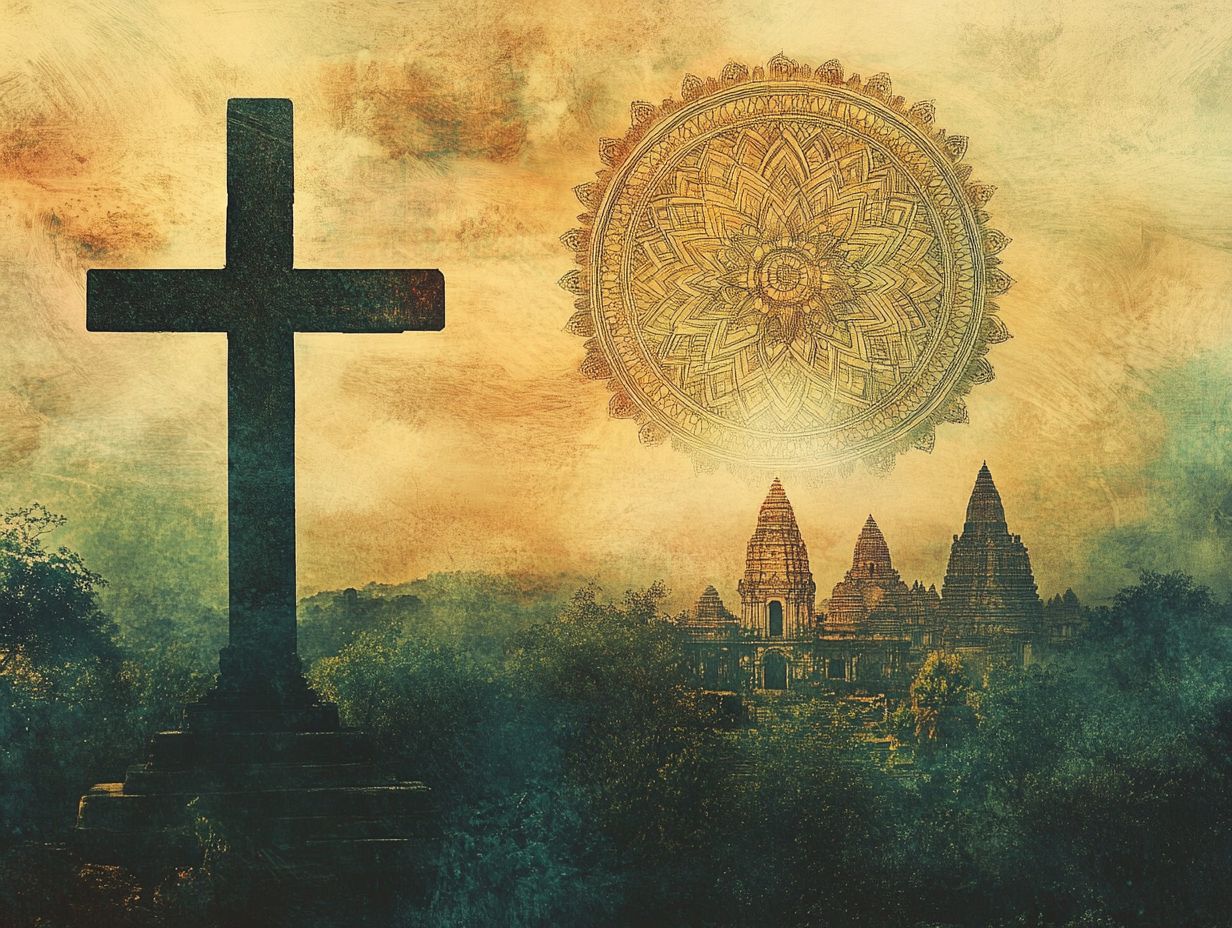How Do Christians View Hinduism?
Hinduism and Christianity stand as two of the world’s major religions, each adorned with a tapestry of rich beliefs and practices. This article delves into how Christians perceive Hinduism, addressing fundamental concepts such as reincarnation, the diverse pantheon of Hindu gods and goddesses, and the intricacies of the caste system.
It meticulously examines the similarities and differences between these faiths, providing valuable insights into how Christians can engage with Hinduism and cultivate meaningful relationships.
Whether one is intrigued by the prospects of interfaith dialogue or seeking a deeper understanding of spiritual diversity, this exploration promises to enlighten and enrich.
What Are the Beliefs of Hinduism?

Hinduism emerges as a richly woven tapestry of beliefs and practices, reflecting a faith system that has evolved over thousands of years. This diverse tradition encompasses an array of philosophies, rituals, and ethical teachings, each contributing to its complexity.
At the heart of Hindu thought lie pivotal concepts such as karma, dharma, and reincarnation, which profoundly influence individual spiritual journeys and moral frameworks. The emphasis on personal spiritual experiences and the quest for enlightenment underscores the religion’s depth, while the vibrant celebrations of numerous festivals and traditions offer a glimpse into the cultural nuances cherished by its followers.
What Is the Christian Perspective on Hinduism?
Christianity engages with Hinduism through a nuanced lens, embodying a blend of respect, curiosity, and often theological discourse surrounding the belief systems that underpin this ancient faith.
Grounded in the teachings of Jesus Christ, Christians acknowledge the value of interfaith dialogue as a means to navigate the intricate tapestry of Hindu practices and beliefs. They also seek to explore the shared moral values evident in both traditions, such as love and compassion, fostering a deeper understanding of each other s spiritual paths.
How Do Christians View the Concept of Reincarnation in Hinduism?
The concept of reincarnation in Hinduism presents significant theological challenges for Christians, who adhere to a linear progression of life culminating in salvation through faith in Jesus Christ. This divergence prompts profound existential inquiries regarding the nature of the soul and the afterlife, as Christians seek to understand a belief system that prioritizes cyclical rebirth over a singular journey toward eternal life.
In Hinduism, the cycle of birth, death, and rebirth known as samsara implies that the soul experiences multiple lifetimes, each shaped by karma, the moral law governing cause and effect. This perspective sharply contrasts with the Christian belief, wherein the soul’s eternal fate is determined by choices made within a single lifetime, leading to either heaven or hell.
These fundamental differences significantly influence interfaith dialogue, encouraging advocates from both religions to examine how their individual beliefs inform ethical living, spiritual fulfillment, and the overarching purpose of existence. Such discussions not only unveil diverse perspectives on salvation and moral responsibility but also underscore the universal quest for meaning that transcends religious divides.
What Is the Christian View on the Hindu Gods and Goddesses?
Christians frequently approach the vast array of Hindu gods and goddesses with a blend of curiosity and theological caution, primarily due to the stark contrast between Hinduism’s polytheistic framework and the monotheism inherent in Christianity. This divergence in perspectives invites profound discussions during interfaith dialogues, as Christians endeavor to grasp the intricate nature of Hindu worship and the myriad representations of the divine.
In the course of these exchanges, Christians often aim to appreciate the cultural significance embodied in Hindu deities, understanding that each god or goddess represents various dimensions of existence and the human experience. For many, recognizing the rich tapestry of beliefs within Hinduism does not compromise their own faith; rather, it enriches their understanding of spirituality that transcends their own traditions.
By engaging in respectful dialogue, both faith communities can identify common values such as compassion, love, and the quest for truth. This mutual recognition ultimately enhances their respective worldviews and fosters coexistence in an increasingly diverse society.
How Do Christians View the Hindu Caste System?
The Hindu caste system frequently attracts critical scrutiny from Christians, especially when considered in the context of the Christian moral teachings that emphasize social justice and equality. This intricate social structure presents ethical dilemmas, prompting Christians to engage in meaningful discussions about religious tolerance and the advocacy of human rights within the framework of interfaith dialogue.
Such discussions reveal the stark contrasts between caste-based discrimination and Christian principles, which uphold the inherent worth of every individual, irrespective of their background. Viewed through this lens, a collaborative approach emerges, facilitating an exploration of how both faiths aspire to the ideals of justice and compassion.
By collectively addressing these ethical dilemmas, adherents of both religions can foster a richer understanding of one another, paving the way for respectful dialogue aimed at bridging divides. This communal effort not only enhances interfaith relationships but also lays the groundwork for joint social action, underscoring the significance of equity and inclusivity across all dimensions of life.
What Is the Christian Response to Hindu Rituals and Practices?

Christians approach Hindu rituals and practices with a diverse array of perspectives, shaped by their own religious convictions and the ethical values that underpin their worship. While some Christians may find appreciation in the cultural richness of Hindu rituals, others might express reservations about practices perceived as conflicting with their own faith. These differing viewpoints often lead to meaningful discussions aimed at fostering interfaith understanding.
This intricate landscape prompts a deeper examination of how individuals can discover common ground while remaining steadfast in their own beliefs. Many Christians acknowledge that engaging with Hindu traditions can provide valuable insights into the vast spectrum of human spirituality, encouraging dialogues that celebrate diversity rather than promote division.
Respectful engagement may encompass attending Hindu festivals or diving into the symbolic meanings of various rituals, all while ensuring that personal beliefs are upheld. Such interactions not only enrich cultural exchange but also present opportunities for Christians to express their faith in a manner that resonates with those from differing spiritual backgrounds, nurturing an atmosphere of respect and collaboration.
What Are the Similarities and Differences Between Hinduism and Christianity?
Hinduism and Christianity, though distinct in their beliefs and practices, exhibit a fascinating interplay of similarities and differences that illuminate their unique cultural perspectives and religious narratives.
Both traditions grapple with fundamental existential questions and advocate for moral values; however, they diverge considerably in their theological frameworks, sacred texts, and interpretations of the divine.
This divergence not only complicates interfaith dialogue but also enriches it, offering profound opportunities for understanding and exploration.
What Are the Shared Beliefs Between Hinduism and Christianity?
Despite their foundational differences, Hinduism and Christianity encompass several core values that resonate deeply, notably the emphasis on love, compassion, and moral teachings that guide their adherents on their spiritual journeys. These shared principles create fertile ground for dialogue and coexistence, as both religions champion a communal spirit and ethical living.
By concentrating on the tenets of love and compassion, followers of these faiths can effectively bridge the divides that frequently separate them. For instance, the teachings that highlight kindness and forgiveness echo profoundly within both traditions, prompting their members to pursue mutual understanding.
This commonality serves as an ideal foundation for interfaith dialogue, fostering social cohesion within diverse communities. When individuals engage in discussions rooted in these universal values, they not only enrich their spiritual paths but also cultivate a deep respect and appreciation for each other’s beliefs, ultimately contributing to the creation of a more harmonious society.
What Are the Key Differences Between Hinduism and Christianity?
The fundamental differences between Hinduism and Christianity reside in their belief systems and theological frameworks, significantly influencing their views on divine entities, the nature of salvation, and the role of rituals in worship. Hinduism embraces a polytheistic perspective, featuring a rich pantheon of gods and goddesses, while Christianity maintains a strict monotheistic belief in one God, resulting in distinct practices and interpretations of faith.
Within this landscape, the divine beings of Hinduism are frequently regarded as manifestations of a singular ultimate reality, known as Brahman. This conception offers followers a diverse array of deities to engage with, each symbolizing various aspects of existence and the cosmos. In contrast, Christianity’s commitment to monotheism shapes its understanding of God as a personal and loving entity, underscored by the doctrine of the Holy Trinity.
The divergent paths to salvation further delineate these two faiths; Hinduism often embraces the cyclical nature of existence, karma, and the observance of dharma, whereas Christianity typically emphasizes faith in Jesus Christ as the exclusive route to eternal life.
The rituals observed in these traditions also fulfill different purposes: Hindu practices are deeply intertwined with cultural significance, while Christianity tends to offer a more communal worship experience, centering on the overarching beliefs in grace and redemption.
How Can Christians Engage with Hinduism?
Engaging with Hinduism offers Christians a remarkable opportunity to enhance their comprehension of diverse belief systems while cultivating mutual respect and community.
Through interfaith dialogue and cultural exchange, Christians can delve into the intricate tapestry of Hindu traditions, rituals, and moral values, ultimately enriching their own spiritual journeys.
This exploration not only broadens their perspectives but also fosters a deeper appreciation for the richness of human spirituality.
What Are Some Ways Christians Can Build Relationships with Hindus?

Building relationships with Hindus requires intentional efforts from Christians to promote interfaith dialogue and cultural exchange that emphasize shared values and mutual respect. By participating in community initiatives and engaging in friendly conversations, Christians can cultivate a deeper understanding and appreciation for Hindu beliefs and practices.
One particularly effective strategy involves Christians attending Hindu festivals, which present a remarkable opportunity to immerse themselves in the rich tapestry of Hindu culture and traditions. Celebrating events like Diwali or Holi not only demonstrates a willingness to embrace diverse customs but also opens the door for meaningful discussions about faith and beliefs.
Furthermore, participating in interfaith events can establish a safe space for open dialogue, where questions can be posed and stories exchanged, give the power toing both groups to learn from one another. Engaging in community service projects together further strengthens these connections, reflecting the core values of empathy and cooperation that are fundamental to both religions.
How Can Christians Share the Gospel with Hindus?
Sharing the Gospel with Hindus necessitates a respectful approach that acknowledges their religious beliefs while thoughtfully introducing the message of Christianity. By emphasizing common values and fostering interfaith understanding, Christians can cultivate an environment conducive to meaningful discussions regarding faith and conversion.
This endeavor requires a profound sensitivity and an appreciation for the rich cultural tapestry that Hinduism embodies. Engaging in faith-based conversations should underscore shared principles such as love, compassion, and ethical living, thereby bridging gaps between differing belief systems.
It is crucial for Christians to engage in active listening, allowing Hindu individuals to articulate their perspectives while demonstrating a genuine interest in their spiritual journeys. By establishing rapport grounded in mutual respect, individuals can navigate their differences with care, paving the way for impactful dialogues that may unveil deeper spiritual truths and potentially foster a connection with the Christian faith.
What Are Some Common Misconceptions Christians Have About Hinduism?
Common misconceptions held by Christians regarding Hinduism often arise from misunderstandings of its beliefs and practices, resulting in confusion and, in some cases, prejudice. Addressing these misconceptions is vital for promoting healthy interfaith dialogue and nurturing a deeper appreciation for the intricacies of Hindu thought and spirituality.
Many individuals may perceive Hinduism solely through the lens of polytheism, interpreting the vast array of deities as indicative of a lack of unity or an unstructured belief system. This viewpoint overlooks the profound philosophical nuances embedded within Hinduism, particularly the concept of Brahman, the ultimate reality that transcends the individual gods.
Furthermore, misconceptions surrounding reincarnation can lead to misunderstandings about morality and ethics, as many fail to recognize the pivotal role of karma in shaping one s life based on past actions.
Through informed discussions and educational initiatives, these misconceptions can be effectively dispelled, inviting Christians to engage with Hinduism with curiosity and openness rather than apprehension.
Frequently Asked Questions
How Do Christians View Hinduism?
Christianity has a diverse range of views on Hinduism, but there are some common beliefs and perspectives that are held by most Christians.
Do Christians consider Hinduism to be a legitimate religion?

Yes, most Christians view Hinduism as a legitimate religion with its own set of beliefs and practices. However, they strongly believe in the teachings of Jesus Christ as the way to attain salvation.
What is the Christian perspective on the Hindu concept of reincarnation?
Christians generally do not believe in the concept of reincarnation as it goes against the belief in one life and one afterlife. They also believe that Jesus Christ’s resurrection provides the ultimate hope for eternal life.
Do Christians believe in the same God as Hindus?
No, Christians believe in one God who is personal and has revealed Himself through Jesus Christ. Hindus, on the other hand, believe in multiple gods and goddesses with different attributes and functions.
How do Christians view the practice of worshipping idols in Hinduism?
Most Christians do not believe in the worship of idols as they consider it to be against the first commandment of having no other gods before the one true God. However, they respect the freedom of individuals to practice their own beliefs.
Is there any common ground between Christianity and Hinduism?
While there are significant theological differences between the two religions, there are some values and beliefs that are shared, such as compassion, love, and the importance of living a moral and virtuous life.
How can Christians engage in respectful dialogue with Hindus?
Christians should approach conversations about Hinduism with an open mind and heart, showing respect for the beliefs of others. They can also seek to understand the cultural and historical context of Hinduism and find common ground for meaningful discussions.
